A trip to the seed saviors
A visit to the Navdanya Foundation of Right Livelihood Award laureate Vandana Shiva - Joseph Wilhelm is convinced of the excellent quality of the Basmati rice
Italy meets Asia: We have a new addition to our Pasta di Riso!
Rapunzel founder, Joseph Wilhelm, hands over to the next generation
New hero coffees for unique coffee enjoyment
Nougat-Cream with Cocoa Butter
New products in October
Green Logistics
New products in July
new in range: jo. bread spread hemp-herbs
Upcycling
Obituary for Bernardo Apaza Lluscu
Turkish harvest report 2020
Cultivation project Azerbijan
Supplier portrait: Basmati rice
Hand-in-Hand fund supports self-help projects
Chocolate creams new in our range
Exquisite spice: Rapunzel Tonka bean
polyphenolia new product
Goodbye to Heike Kirsten
Limited capacity
Biodiversity
Fruit paste
Aceto balsamico de modena assessed
New retro nut butters
Coconut almond butter with date awarded
Organic film packaging
Second generation assumes responsibility at Rapunzel
HAND IN HAND workshop
More Transparency
Donation to Seed Fund
Navdanya the seed preserver
CSR Award
During his recent trip to India, Rapunzel founder and managing director Joseph Wilhelm also visited Vandana Shiva and her Navdanya Foundation. Navdanya's core mission is the establishment of a seed bank with traditional, indigenous rice varieties. Traditional medicinal herbs are also collected and propagated by Navdanya.
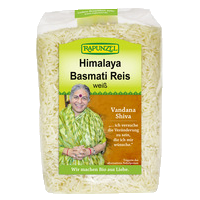
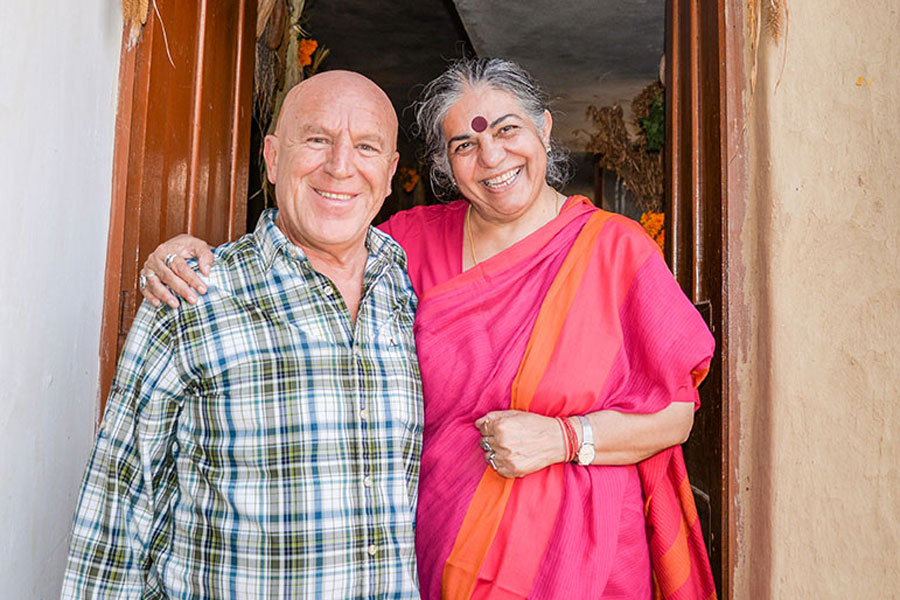
With Vandana Shiva, I have a close, personal friendship. She personally supported our "Genfrei Gehen" campaign and she is a jury member of our "One World Award". I was planning to visit her for a long time already. During my India trip in the end of 2017, I finally had the chance to visit her.

Vandana Shiva founded the Navdanya organization in 1991. Navdanya means "nine seeds" and symbolizes the protection of the ecological and cultural diversity of seeds. In India, this network of local communities and organizations is the pioneer of a movement that saves and protects regional seeds of traditional crops. Navdanya collects regional varieties and cultivates them on an experimental farm in the city of Dehradun, in Northern India, in the Himalayan foothills, in order to save traditional varieties from extinction.
The goals of Navdanya: to support organic cultivation techniques, to protect the farmers from the dependance on patented seeds or hybrid seeds, to provide healthy foods to the people and to strengthen local markets. Navdanya also offers training courses for farmers and organizes distribution channels for organic food products.
A very special university
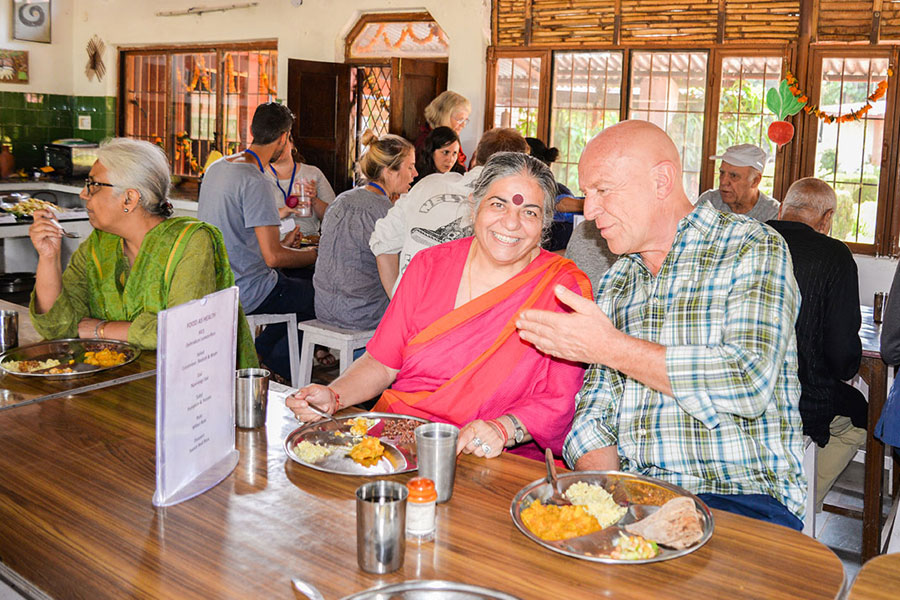
Not only seed diversity and biodiversity are preserved at Navdanay, but also the communal spirit - like eating together in the cantine
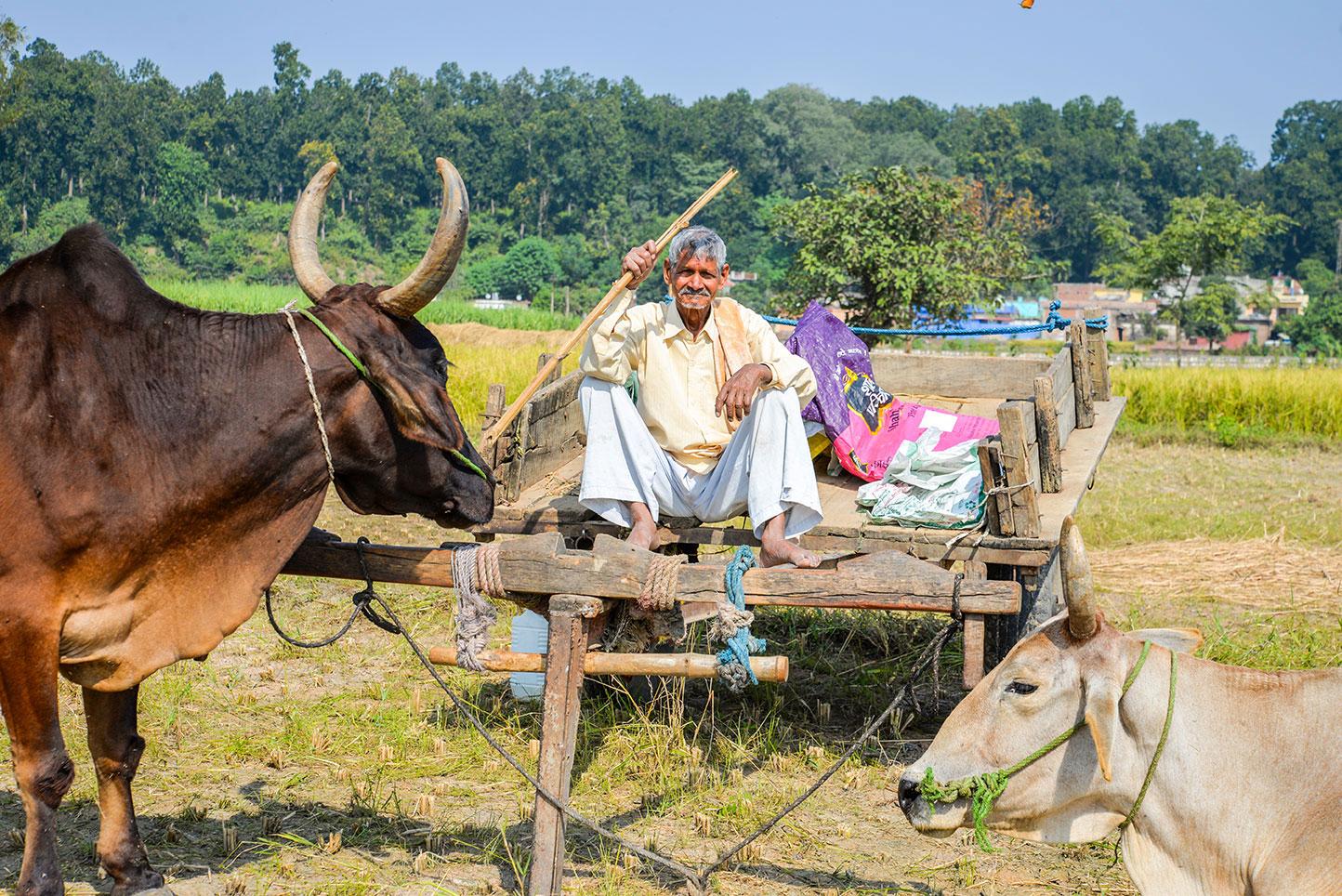
A Navdanya farmer during rice harvest. Farming is done traditionally.
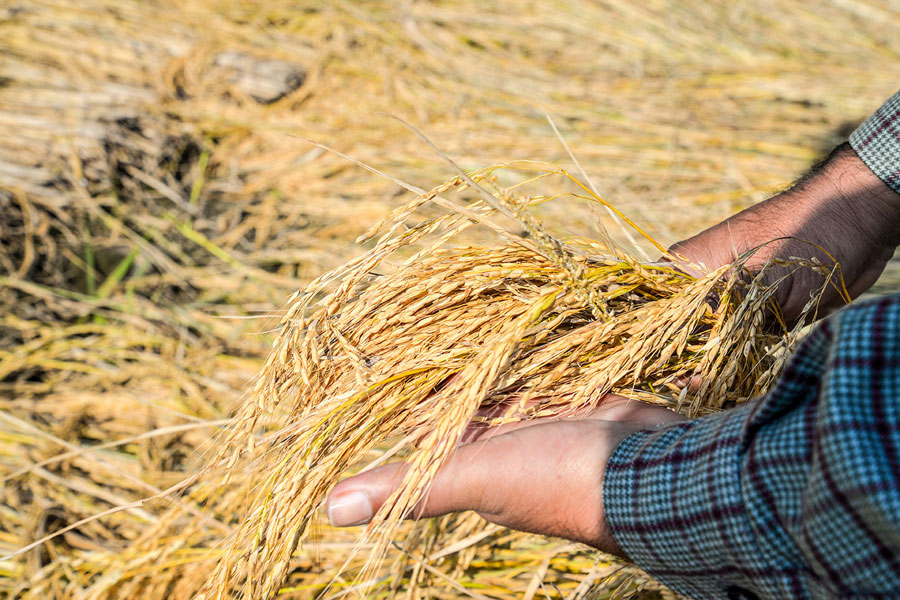
Navdanya also offers training courses for farmers and organizes the distribution for organically cultivated products.
The so-called Navdanya Earth University is located approximately one hour's car drive north of the five million city Dehradun in the Southern foothills of the Himalaya.
The simple and clean university buildings, including the guest houses, training facilities and a communal dining hall, are surrounded by the areas for seed propagation and field crops that are grown for own use.
International participants visit the different seminars. During this time, the visitors live on the campus. The two-story houses are located in the shade of big mango trees. Yoga lessons are offered inn the mornings.
In addition to agricultural and horticultural courses, the university also offers classes on sustainability and health. Visiting lecturers offer spiritual lessons.
In addition to agricultural and horticultural courses, the university also offers classes on sustainability and health. Visiting lecturers offer spiritual lessons.
The communal spirit is emphasized by the Earth University. All visitors eat simple, but tasty meals made exclusively from local ingredients. Everybody cleans his or her own dirty dishes.
The cooking is done by an excellent Nepalese chef - Nepal is only 40 km away.
The cooking is done by an excellent Nepalese chef - Nepal is only 40 km away.
Organic farming for a secure future
Training of the Indian farmers is an essential part of the curriculum. Navdanya teaches not only organic agriculture but supports more than 5,000 associated farmers with their work. Moreover, Navdanya also organizes the marketing of the crops that include rice, different varieties of millet and amaranth.
The farmers get better prices, because part of the harvest is exported.
We get to visit several rice farmers. Rice is not only the most important, cultivated staple crop for the peasants, but also the so-called „cash crop“. With the surplus rice harvest, the farmers secure their income.
We get to visit several rice farmers. Rice is not only the most important, cultivated staple crop for the peasants, but also the so-called „cash crop“. With the surplus rice harvest, the farmers secure their income.
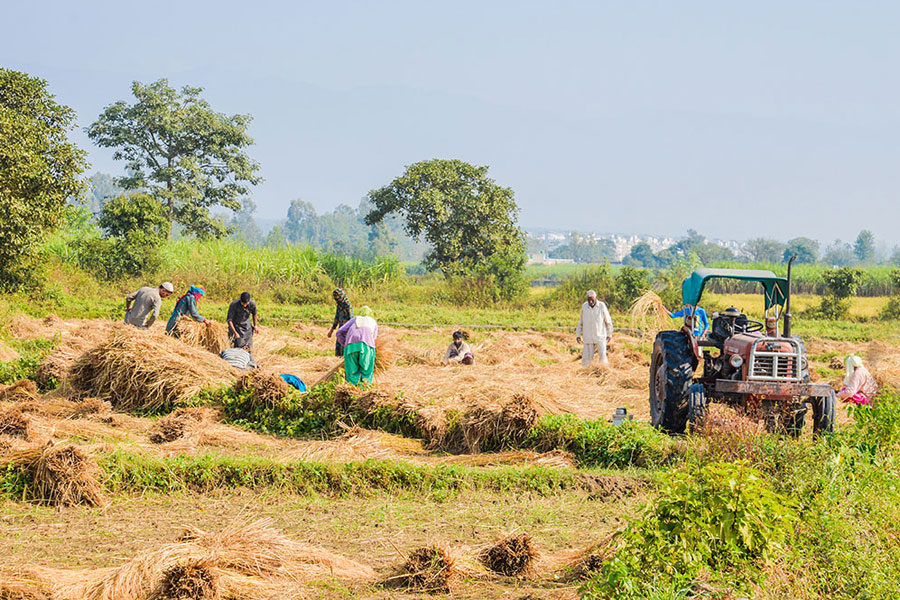
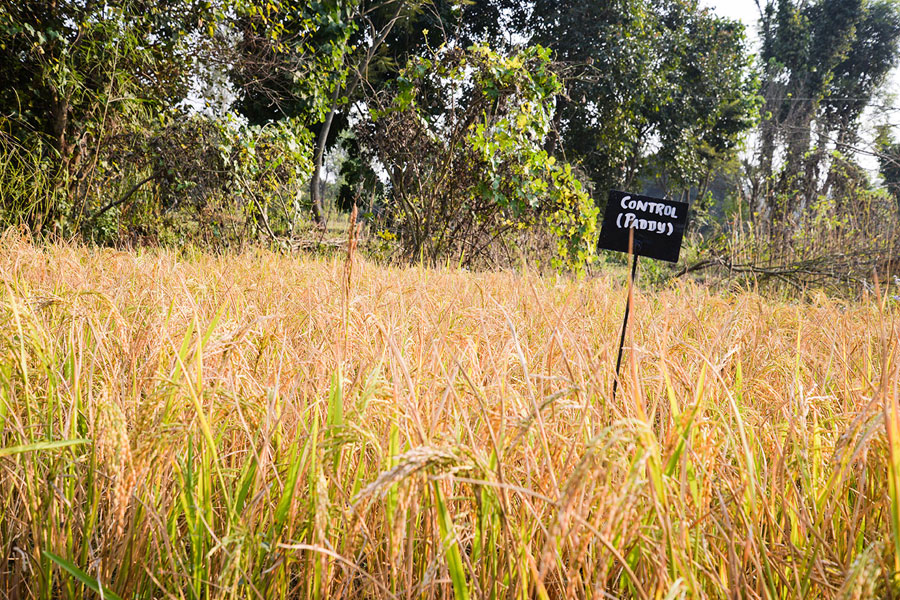
Years ago, India had more than 100,000 different rice varieties, but the diversity decreased dramatically. Navdanya tries to preserve the diversity with their seed bank for endemic and traditional varieties.
Navdanya's core mission is to establish a large seed bank for endemic and traditional varieties, especially for rice and legume varieties.
This way, seeds as an important cultural heritage are not only saved for the farmers for seeding and propagation. The seeds are also safeguarded against access by multinational agrochemistry and seed corporations.
This way, seeds as an important cultural heritage are not only saved for the farmers for seeding and propagation. The seeds are also safeguarded against access by multinational agrochemistry and seed corporations.
In order to add more weight to Vandana Shiva and to Navdanya at both the national and international level, the organization runs an office in Delhi, India's capital. Two natural health food stores sell the products of the associated organic farmers.
The stores also market cotton textiles under the slogan„Fibers of freedom“. Navdanya expresses with these products that are made from their own cotton seeds their struggle against the agro-corporation Monsanto.
The stores also market cotton textiles under the slogan„Fibers of freedom“. Navdanya expresses with these products that are made from their own cotton seeds their struggle against the agro-corporation Monsanto.
The farmers' fight against genetic engineering
With genetically manipulated cotton seeds, Monsanto wants to force Indian peasants into a monopolized system. Monsanto is promoting GMO-cotton very successfully much to the chagrin of the farmers. Because the farmers are not only forced to buy hybrid seeds (that cannot be propagated) from Monsanto, but they are also forced to exclusively use the herbicide Glyphosat that is marketed by Monsanto for the treatment of resistant GMO-plants.
At the same time, the need for chemical fertilizers is growing, because the GMO-cotton plants need to be heavily fertilized in order to produce the propagated yield. Many farmers can no longer afford the expenses of the so-called green revolution. Due to their economic misery and their dependance on banks, already 300,000 Indian peasants have committed suicide in recent years. Many of these peasants killed themselves by drinking the herbicide Glyphosat.
The tireless, global effort of Vandana Shiva and her Navdanya Foundation is needed, in order to spread the information about these existential topics.
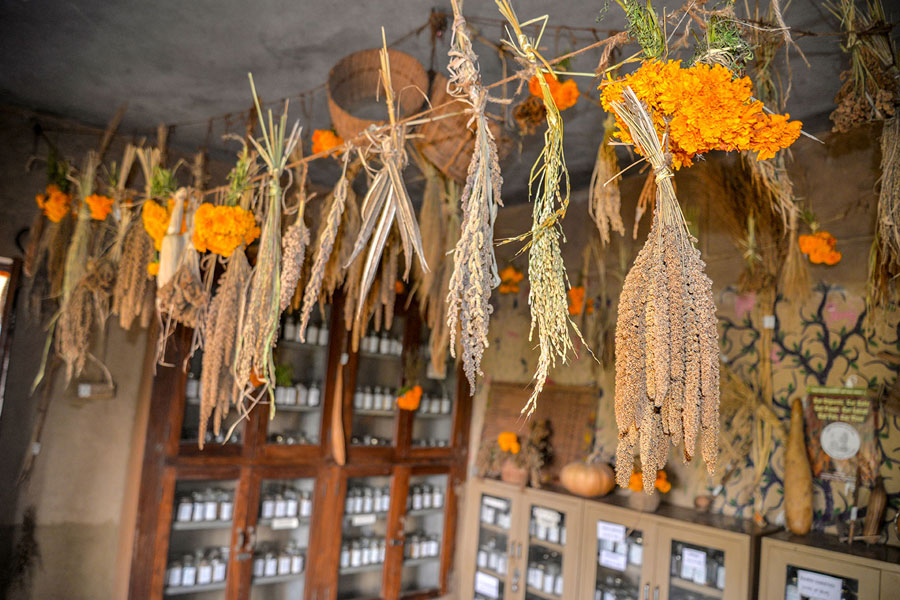
In the seed bank, traditional seeds are saved and collected for breeding
